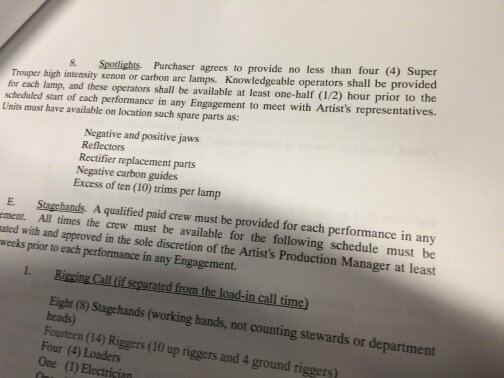Chris Chapman
Active Member
We've all been there before. A Road Show is coming in. The fun of doing the Advance work on a tour. The fun bonus fun of getting an advance light plot and making it work. And then being able to execute everything so the Tour is happy, and your audience enjoys the show.
I had a little bit of a rough one yesterday. The LD wasn't on the tour, and he was usually the Board Op. The lighting design was based on a larger cast, and featured specials specifically for that cast. The Tour cast was fluctuating in size as well, so not a lot of help on that. "Here's a two minute video of the opening number. Make it look like that." So we struggle to get a compromise on the design with this epic quote from the Designer: "The show is good enough that you can run it under worklights and your audience will love it. Make it look nice."
So the LD signs off basically on me doing whatever I want with his show. He sends me a cue list for general ideas on looks and I'm on my own. OK. That's actually pretty cool, but I'm worried because I'm still running the show blind. We hang a modified version of his plot, and prep the stage with platforming as specified in the rider and focus off of that. I get in a quick pass on looks before they load in.
Tour shows up for load in. "Oh, this setup is terrific" they say. Except "We need to move it all downstage six feet." Half of the light plot goes right into the trash. We do an emergency refocus DURING dinner break.
All in all it turned out OK, but as being the local guy, I'm pretty sick of Tour Riders that aren't based on reality and PM's coming in and trashing a days work. I totally understand why Tour have riders and the need for it. But can't we get some level of compromise and getting riders written that actually reflect the show on tour? Not the first time this has happened. I had one show that had a VERY specific audio package that we ended up renting a good chunk of, and then they walked in the door and announced they weren't going to use ANY of that gear.
End rant. Big Sigh. Need to repaint my show deck for now for next weeks rental gig. Joy.
I had a little bit of a rough one yesterday. The LD wasn't on the tour, and he was usually the Board Op. The lighting design was based on a larger cast, and featured specials specifically for that cast. The Tour cast was fluctuating in size as well, so not a lot of help on that. "Here's a two minute video of the opening number. Make it look like that." So we struggle to get a compromise on the design with this epic quote from the Designer: "The show is good enough that you can run it under worklights and your audience will love it. Make it look nice."
So the LD signs off basically on me doing whatever I want with his show. He sends me a cue list for general ideas on looks and I'm on my own. OK. That's actually pretty cool, but I'm worried because I'm still running the show blind. We hang a modified version of his plot, and prep the stage with platforming as specified in the rider and focus off of that. I get in a quick pass on looks before they load in.
Tour shows up for load in. "Oh, this setup is terrific" they say. Except "We need to move it all downstage six feet." Half of the light plot goes right into the trash. We do an emergency refocus DURING dinner break.
All in all it turned out OK, but as being the local guy, I'm pretty sick of Tour Riders that aren't based on reality and PM's coming in and trashing a days work. I totally understand why Tour have riders and the need for it. But can't we get some level of compromise and getting riders written that actually reflect the show on tour? Not the first time this has happened. I had one show that had a VERY specific audio package that we ended up renting a good chunk of, and then they walked in the door and announced they weren't going to use ANY of that gear.
End rant. Big Sigh. Need to repaint my show deck for now for next weeks rental gig. Joy.



